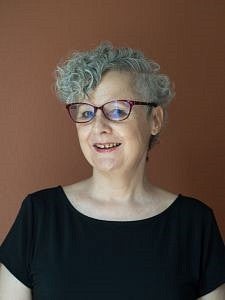
The Faculty Excellence in Universal Design for Learning Award committee is very pleased to announce Dr. Elizabeth (Betsy) Wheeler as the 2022/2023 award recipient! Betsy has made numerous and powerful contributions to the University of Oregon. Her leadership, innovation, and dedication to students and accessibility has had a profound impact on students, colleagues, the campus, and disabled communities.
Betsy Wheeler founded the University of Oregon Disability Studies Minor in 2017 and served as its director for six years. Now retired, Betsy taught courses on race and disability, inclusive theater, ENG 205: Fantasy, ENG 240: Introduction to Disability Studies, and ENG 386: Bodies in Comics. She researches the presence of disabilities in public space as represented in literature, visual/verbal popular culture, history, and urban planning. Her book HandiLand: The Crippest Place on Earth (U Michigan Press, 2019) received the Choice award, and her research will next appear in the Journal of Literary and Cultural Disability Studies. In 2018, Lane Independent Living Alliance presented her with the LILAC Award for her advocacy for disability communities.
Betsy’s nomination highlights her dedication, passion, and leadership related to accessibility, inclusion of disabled students, and inclusive teaching. Here is what one of her nominators had to say:
"Dr. Wheeler shows a consistent commitment to UDL practices in her classrooms and actively promotes UDL. This is especially true for the classes she teaches for the Disability Studies minor. In these classes, UDL is part of the lived experience and the curriculum. We learn not just what UDL is nor just what it feels like to experience a classroom environment with such dedication to UDL, but also why UDL is essential to an institution of higher learning.
Betsy is one of the friendliest professors I have had the immense pleasure of meeting. As a disabled student at the University of Oregon, I felt alone. I didn't know many other disabled students. It's not like that in Betsy's classrooms. First off, Betsy is and has been an invaluable resource for disabled students on this campus. She is familiar with both campus resources and community resources that could benefit disabled students. Second, I met some of my closest friends while sitting at a table in Betsy's Intro to Disability Studies Class. Her class gave us the chance to talk about the lived experience of having a disability in college. A few of these friends became core members of AccessABILITY Student Union (The disability affinity group for the University of Oregon). Her classroom's consistent use of UDL has not only created an equitable learning environment for University of Oregon students but it has also allowed students to build a community for themselves. Betsy's commitment is that of a fierce advocate and I am honored to have been in her tutelage."
We contacted Betsy to congratulate her and asked about her perspective on the use of Universal Design for Learning. Here is what she shared with us:
“It means a great deal to me to receive the Faculty Excellence in Universal Design Award. I’m happy such an award exists, because it draws attention to a crucial and often-neglected area of teaching. I’ve gained and implemented my knowledge of Universal Design in Learning gradually, following the “Plus One” principle I learned from Marla Wirrick at UO Online: each time you teach a class, add one more accessibility feature. Some of these features are technical, like adding headers to documents, turning the captions on, and assigning accessible pdfs from eBook chapters or UO Libraries Scan and Deliver instead of my old hand-scanned versions. Some UDL features are policies, like the banning of timed tests and a clear protocol for making up absences. Some features are interpersonal and communicative, like welcoming students warmly, writing clear and transparent assignments, and allowing students to complete classroom tasks on their own as an alternative to groupwork. I disclose my own disabilities, ask students for their patience and accommodation of them, and promise them the same consideration. My course content also constitutes a form of access, allowing students with disabilities to see themselves reflected in the curriculum and all students to learn how they can implement access. I use Universal Design features as teachable moments, showing students how the world at large should work.”
Please join us in congratulating Betsy for her exemplary use of Universal Design for Learning and the meaningful impact she continues to have here at UO and beyond.
